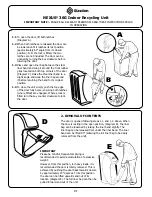
COLD WEATHER OPERATION
07.1
Cold Weather Operation
11-04
RoGator 418
Minimising the Effect of Cold
Weather
Caterpillar diesel engines are designed to operate
effectively in cold weather.
However, for effective starting and cold weather
operation, a little extra care is necessary. The in-
formation below outlines steps that can minimize
the effect that cold weather may have on starting
and operation of your engine. See your authorized
engine distributor or servicing dealer for additional
information and local availability of cold weather
aids.
Use Winter Fuel
When temperatures fall below 5
°
C (40
°
F), winter
diesel fuel is recommended for your engine. (See
also Operation and maintenance manual of the
engine).
Seasonal Viscosity Oil and Proper Coolant
Concentration
Use seasonal grade viscosity engine oil based on
expected air temperature range between oil
changes and a proper concentration of low silicate
antifreeze as recommended.
Idling the Engine
Avoid excessive engine idling. Prolonged idling may
cause the engine coolant temperature to fall below
its normal range. This, in turn, causes crankcase oil
dilution, due to incomplete fuel combustion, and
permits formation of gummy deposits on valves,
pistons, and piston rings. It also promotes rapid
accumulation of engine sludge and unburned fuel in
the exhaust system.
Once an engine is warmed to normal operating
temperatures, engine should be idled at slow idle
speed. Slow idle speed for this engine is 750 rpm at
factory. If an engine will be idling for more than 5
minutes, stop and restart later.
Engine Coolant Specifications
Cont act your authorized servicing dealer or engine
distributor to determine what the cooling system of
this engine is filled with and the winter freeze pro-
tection level.
Coolant solutions of quality water, ethylene glycol
concentrate (antifreeze), and supplemental coolant
additives (SCA’s) MUST be used year-round for
freeze protection, boil-over protection, liner erosion
or pitting, and to provide a stable, noncorrosive
environment for seals, hoses and metal engine
parts.
Water Quality
Water quality is important to the performance of
the cooling system. Distilled, deionized, or demin-
eralized water is recommended for mixing with
ethylene glycol base engine coolant concentrate.
Mineral (hard/tap) water should NEVER be put in a
cooling system unless first tested.
Ethylene Glycol Concentrate (Antifreeze)
IMPORTANT: Do NOT use ethyleneglyckol
concentrate containing sealer or stop-leak ad-
ditives.
IMPORTANT: Never use automotive-type cool-
ants (such as those meeting ASTM D3306 or
ASTM D4656). These coolants do not contain
the correct additives to protect heavy-duty
diesel engines. They often contain a high con-
centration of silicates and may damage the
engine or cooling system.
Caterpillar Antifreeze/Summer Coolant Con-
centrate
This product contains ethylene glycol (low silicate
antifreeze) and supplemental coolant additives
(SCA’s). It must be mixed with quality water, as
described in this section, before adding to the en-
gine cooling system. The proportion of water to be
used depends upon the lowest freeze protection
temperature desired according to the following
table:
Concentrate (%)
Freeze Protection Limit
50
-36
°
C
60
-51
°
C
Supplemental Coolant Additives (SCA’s)
IMPORTANT: Check inhibitors between the
drain intervals every 600 hours or every 12
months. Replenish inhibitors by the addition of
a supplemental coolant additive as necessary.
Do NOT over inhibit antifreeze solutions.
Additives eventually lose their effectiveness
and must be recharged with additional Sup-
plemental Coolant Additives (SCA’s) available
in the form of liquid coolant conditioner. (See
also Operation and maintenance manual of the
engine).














































